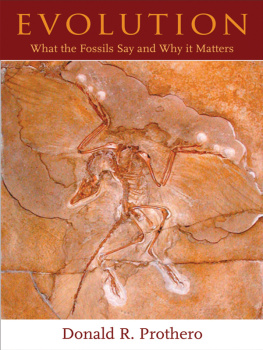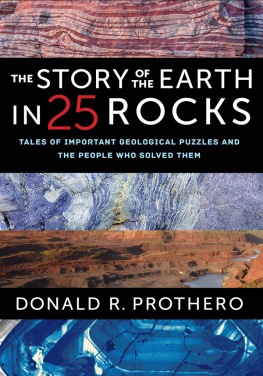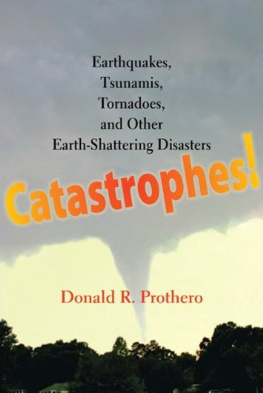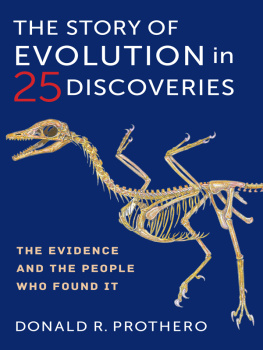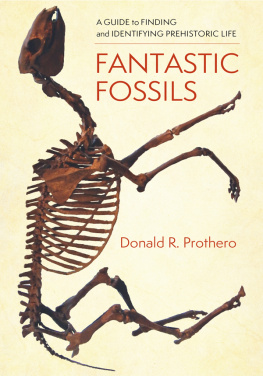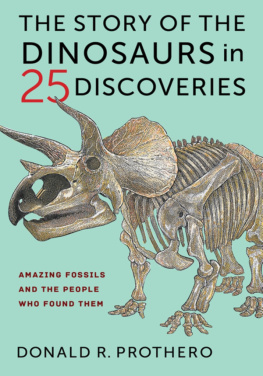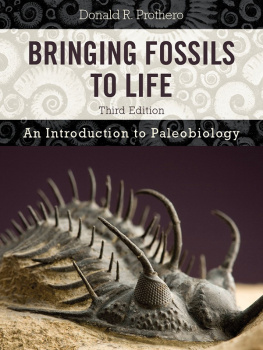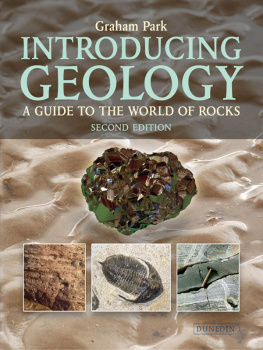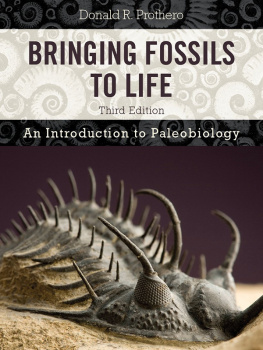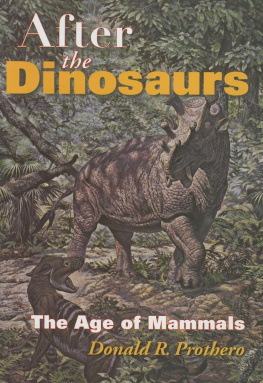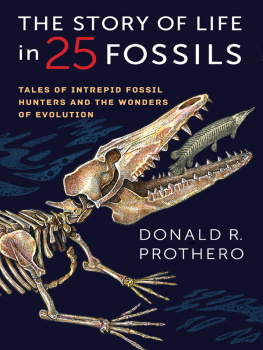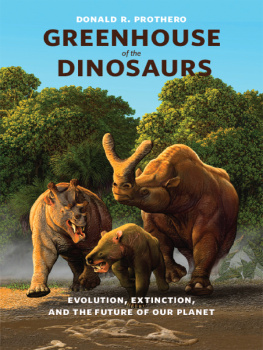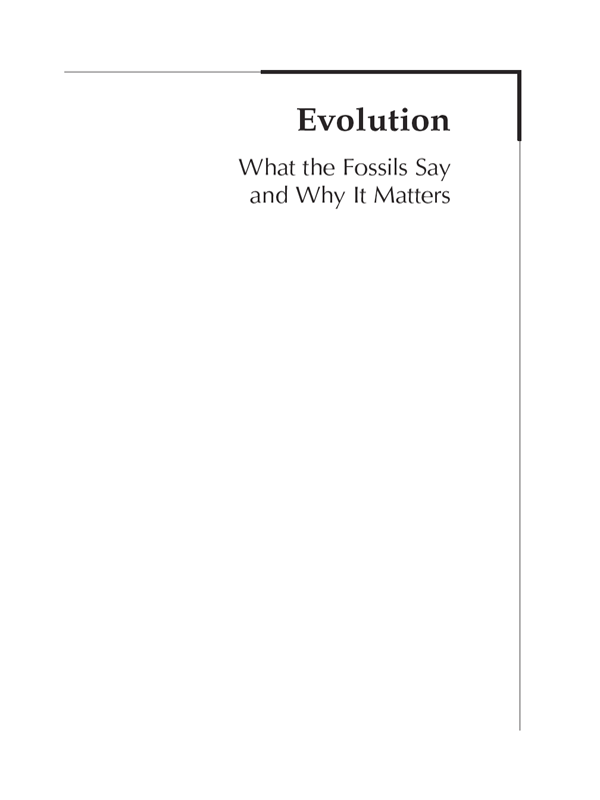Cover image: The beautiful image of Archaeopteryx is used courtesy of the Humboldt Museum, Berlin. For the full story about this magnificent fossil and Archaeopteryx see chapter 12. Photo and drawing for title page courtesy M. Ellison and M. Norell, American Museum of Natural History; page ix drawing courtesy M. Ellison and M. Norell, American Museum of Natural History
Columbia University Press
Publishers Since 1893
New York Chichester, West Sussex
cup.columbia.edu
Copyright 2007 Columbia University Press
All rights reserved
E-ISBN 978-0-231-51142-1
Library of Congress Cataloging-in-Publication Data
Prothero, Donald R.
Evolution : what the fossils say and why it matters / Donald R. Prothero ; illustrated by Carl Buell.
p. cm.
Includes bibliographical references and index.
ISBN 978-0-231-13962-5 (cloth : acid-free paper)
1. Evolutionary paleobiology. 2. Evolution (Biology) 3. Paleogeography.
I. Buell, Carl Dennis. II. Title.
QE721.2.E85P76 2007
576.8dc22
2007028804
A Columbia University Press E-book.
CUP would be pleased to hear about your reading experience with this e-book at .
To my friends and mentors, Niles Eldredge and the late Stephen Jay Gould, who transformed both paleontology and evolutionary biology
Foreword
Why People Do Not Accept Evolution
Michael Shermer
Thomas Henry Huxley proclaimed the Origin of Species to be the most potent instrument for the extension of the realm of knowledge which has come into mans hands since Newtons Principia. Ernst Mayr, arguably the greatest evolutionary theorist since Darwin, asserted that the Origin of Species triggered the greatest paradigm shift in the history of science. The late paleontologist Stephen Jay Gould, who inherited Huxleys mantle as public intellectual, called the theory of evolution one of the half dozen most important ideas in the entire history of Western thought. The philosopher of science Daniel Dennett called evolution the most dangerous idea in the history of science.
If Darwins theory of evolution is so profound and proven, why doesnt everyone accept it as true? Before we review the reasons, please note that I use the verb accept instead of the more common expression believe in. Evolution is not a religious tenet to which one swears allegiance to or belief in as a matter of faith. It is a factual reality of the empirical world. Just as one would not say, I believe in gravity, one should not proclaim, I believe in evolution. So why do so many people not accept evolution? I suggest that there are at least seven reasons.
1. Misunderstanding of evolutionary theory. Because of the controversy generated by the evolution-creation debate, the subject is often not included in science curricula, or if it is, teachers opt out of teaching it to avoid tensions and conflict with administrators and parents.
2. A general fear that science is a threat to religion. This falls under the rubric of what I call the conflicting worlds model of science and religion, where one is forced to choose one over the other, which I contrast with the same worlds model in which an attempt is made to use science to prove religious tenets, and the separate worlds model, where science and religion occupy entirely different domains.
3. A specific fear that evolutionary theory is a threat to religion. For specific religious tenets, such as that of the age of the earth or the sequence of creation in Genesis, science and religion are in conflict. Fortunately, most of the worlds religions are flexible enough to adjust to the ever-changing findings of science and read their origin myths as allegory.
4. The fear that evolution degrades our humanity. After Copernicus toppled the pedestal of our cosmic centrality, Darwin delivered the coup de grce by revealing us to be mere animals, subject to the same natural laws and historical forces as all other organisms.
5. The equation of evolution with ethical nihilism and moral degeneration. The reasoning behind this fear runs along these lines: Evolution implies that there is no God, so belief in the theory of evolution leads to atheism; without a belief in God there can be no morality or meaning; without morality and meaning there is no basis for a civil society; without a civil society we will be reduced to living like brute animals. Such illogic was voiced in 1991 by the neoconservative social commentator Irving Kristol: If there is one indisputable fact about the human condition it is that no community can survive if it is persuadedor even if it suspectsthat its members are leading meaningless lives in a meaningless universe.
6. The fear that evolutionary theory implies we have a fixed or rigid human nature. This is a variant of genetic determinism and is a criticism leveled against sociobiology and evolutionary psychology because of the deterministic implication that we are resistant to political reforms and economic reapportionment policies. Interestingly, the first five reasons above tend to arise from the political right because of its strong religious conservative bent that sees evolutionary theory as a challenge to fundamental religious doctrines; this last reason surfaces from the political left because of its strong liberal bent that sees evolutionary theory as a challenge to their fundamental political doctrines. I call these positions conservative creationism and liberal creationism, respectively.
7. The equation of evolution with mutual struggle instead of mutual aid. An especially odious myth about evolution is the presumption that animals and humans are inherently selfish and that nature, in Tennysons memorable description, is red in tooth and claw. After The Origin of Species was published, the British philosopher Herbert Spencer immortalized natural selection in the phrase survival of the fittest, one of the most misleading descriptions in the history of science that has been embraced by social Darwinists ever since, applying it inappropriately to racial theory, national politics, and economic doctrines. Even Darwins bulldog, Thomas Henry Huxley, reinforced what he called this gladiatorial view of life in a series of essays, describing nature whereby the strongest, the swiftest, and the cunningest live to fight another day.
This view of life need not have become the dominant one. In 1902 the Russian anarchist and social commentator Petr Kropotkin published his rebuttal to Spencer and Huxley in his book Mutual Aid. Calling out Spencer by phrase, for example, Kropotkin notes: If we... ask Nature: who are the fittest: those who are continually at war with each other, or those who support one another? we at once see that those animals which acquire habits of mutual aid are undoubtedly the fittest. They have more chances to survive, and they attain, in their respective classes, the highest development of intelligence and bodily organization. In numerous trips to the wild hinterlands of Siberia, Kropotkin discovered that animal species there were highly social and cooperative in nature, an adaptation for survival that he deduced played a vital role in evolution. In the animal world we have seen that the vast majority of species live in societies, and that they find in association the best arms for the struggle for life: understood, of course, in its wide Darwinian sensenot as a struggle for the sheer means of existence, but as a struggle against all natural conditions unfavourable to the species.
Kropotkin may have been an anarchist but he was no crackpot when it came to human nature. There is an immense amount of warfare and extermination going on amidst various species, he admitted, noting that the self-assertion of the individual is the other current in our nature that must be recognized. However, he added, there is, at the same time, as much, or perhaps even more, of mutual support, mutual aid, and mutual defense.... Sociability is as much a law of nature as mutual struggle.

